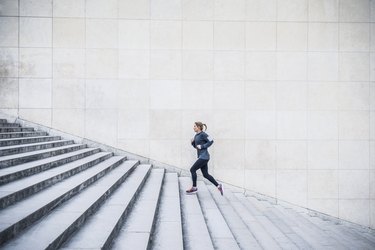
Some joggers prefer to eat before and some after, but you may wonder which is better. While a certain part of this decision should be based on how eating makes you feel before, during and after exercise, several other factors are important to consider.
Depending on your jogging routine, a meal can make or break it.
Video of the Day
Video of the Day
Tip
Eat first if you plan on jogging in the morning; eat after if you plan on jogging later in the day. It all comes down to preference and your hunger pangs.
Timing Is Everything
If you jog first thing in the morning, you may be better off eating first. Your last meal or snack is likely to have digested already, leaving little to fuel your workout. Having a meal an hour or three before you jog in the morning stabilizes blood sugar and gives you energy, says the Academy of Nutrition and Dietetics; whereas jogging without eating could result in feeling lightheaded and sluggish.
If you prefer to jog later in the day, you may be able to wait to eat until after you jog. Since your body has been refueled already during the day, jogging before eating again can allow you to go at a faster pace because you don't have a meal sitting in your stomach.
Intensity and Duration
If your jogging session will last for more than an hour, you should eat before you start. Have a meal about three to four hours before you plan to jog or a snack an hour prior. This will give your body the energy it needs to sustain a long bout of exercise. An intense jog also necessitates eating afterward to refuel your body, build muscle and replace your glycogen stores. A short jog allows you to eat before or after, depending on your preferences, according to the Mayo Clinic.
Meal or Snack?
Most joggers say that eating a heavy meal makes it more difficult to perform. On the other hand, too little to eat could make it harder to finish your jog. Choosing the right size meal based on how soon you will be jogging will make your workout more effective and reduce the chances of cramps or being slowed down. If you don't plan to jog for at least three hours, a meal is a good option. A snack is enough to fuel your jogging session if you are ready to go in less than an hour after eating, says Go Ask Alice!
What Foods to Eat
Before a jog, foods that digest easily will give you the energy you need to complete your workout, but are less likely to result in cramps. Good choices include crackers, bagels or bread. A longer jogging session requires additional carbohydrates, which you can get from bananas and yogurt.
Skip high-fiber foods, caffeine and fatty foods, which may make you uncomfortable while you're jogging as your body directs blood away from your muscles and toward your digestive system, causing muscle cramps, recommends Health.gov.
If you wait to eat until after your jog, choose foods like a peanut butter sandwich, string cheese and crackers, nuts and fruit, yogurt or a regular meal with protein, healthy fats and carbohydrates. These choices will replenish your energy stores.